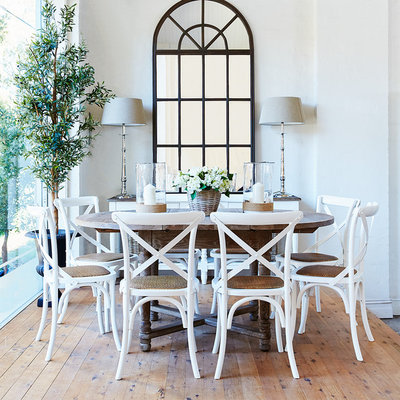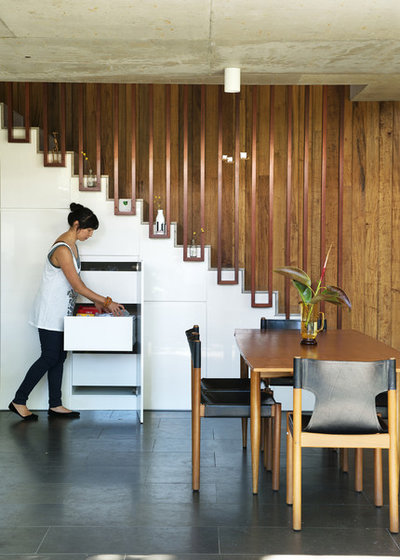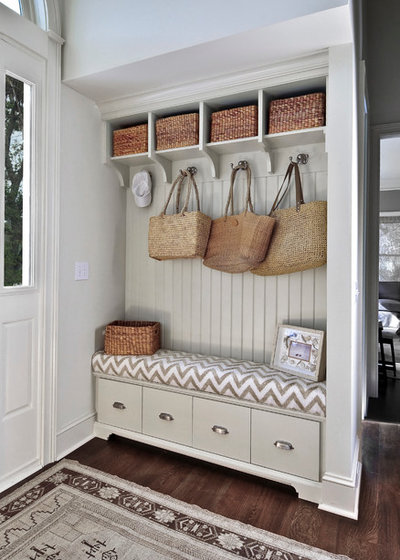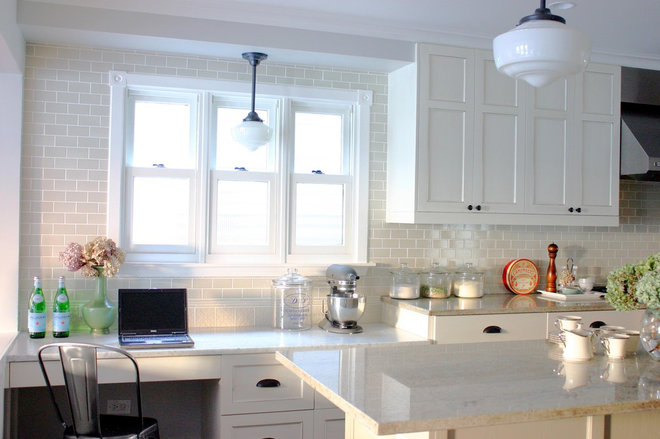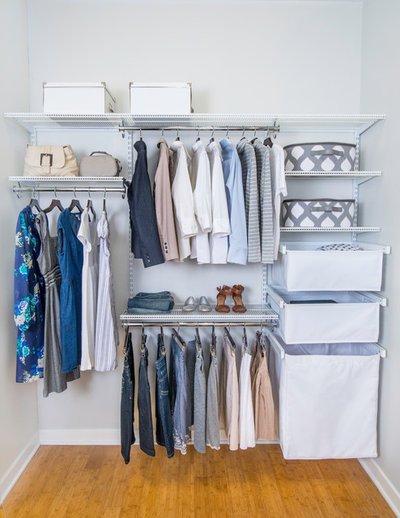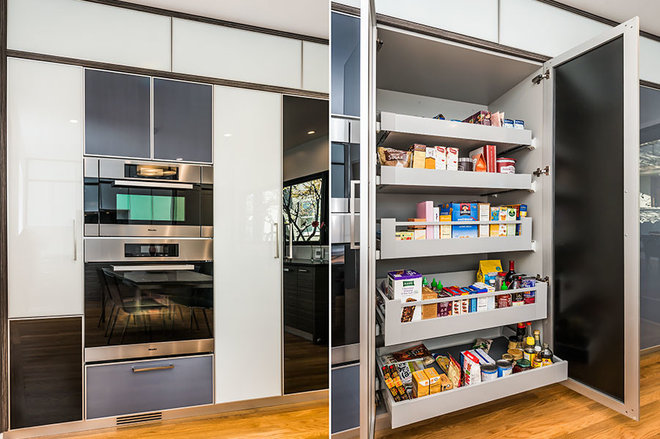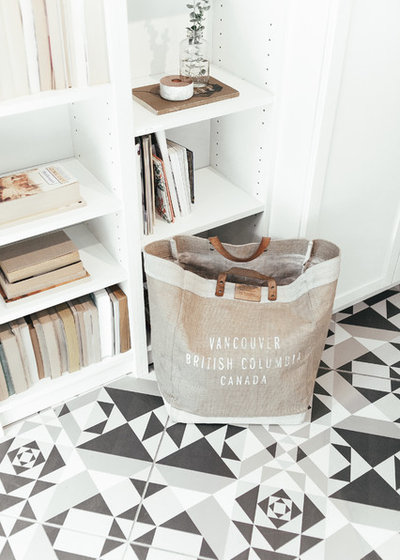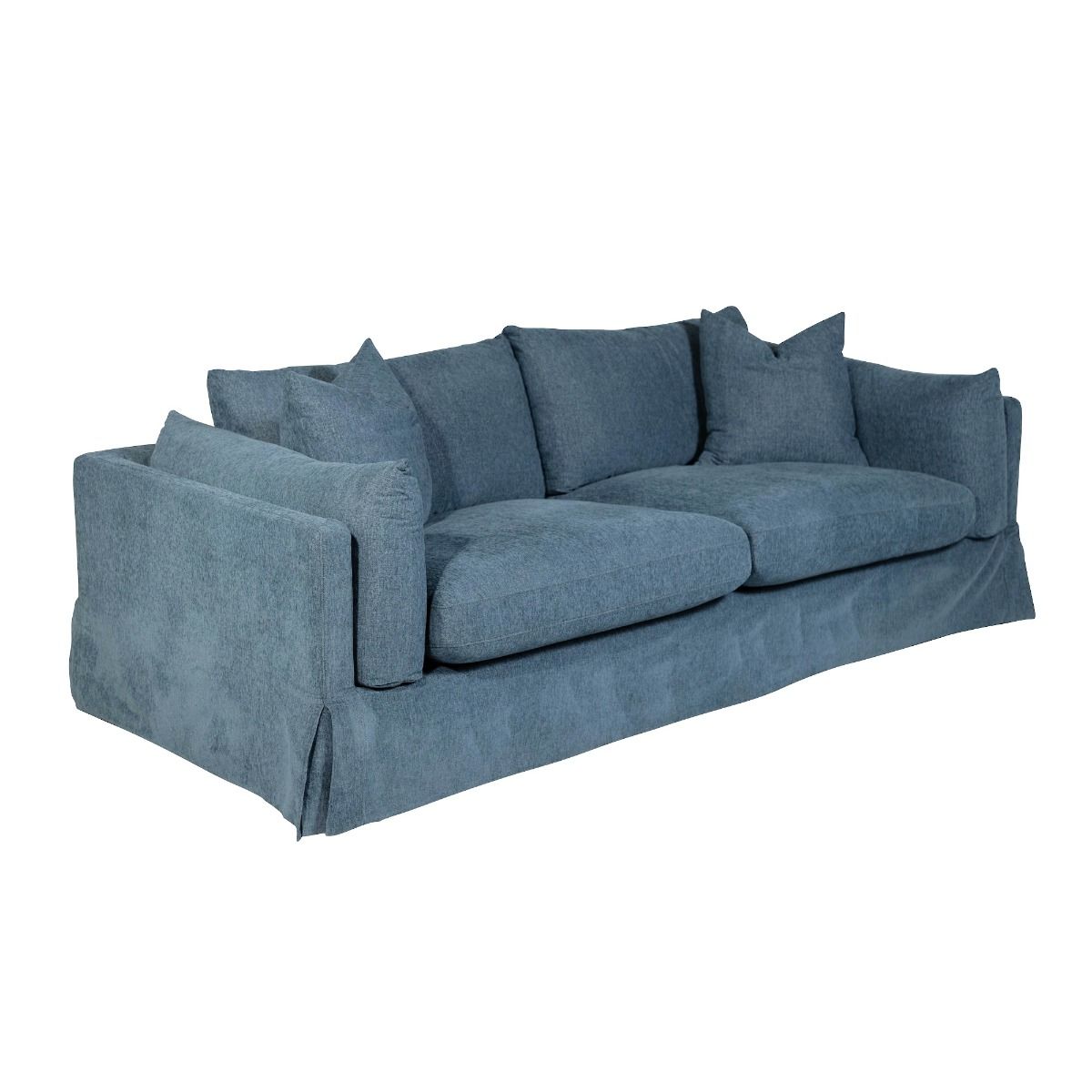8 Secrets of People With Beautifully Organised Homes
Author: Jeanne Taylor Date Posted:26 September 2019


Discover the strategies of people who easily keep their homes orderly while raising families and maintaining busy lives
As a professional organiser, I work with people who have a wide variety of personalities, and see inside their cupboards, drawers, cabinetry, garages and even spaces under beds. Through my intimate observations, I have learnt the secrets of maintaining an orderly home, and in this article I share eight with you.
Find a professional organiser or storage designer near you on Houzz to create a beautiful, organised home
My clients who successfully maintain organised homes all make decisions quickly. They are good at getting rid of items they no longer use, and they try to let go of things that they might use… someday.
They let go of clothes that no longer fit or are excessively worn. They even get rid of expensive clothes that might come back in vogue someday, because they understand that if a style does experience a comeback, it is usually slightly different. And yes, these clients may need to hire a professional organiser to manage the decluttering and organising process, but they quickly take suggestions to heart.
For the majority of my clients, decisive or not, sentimental items and gifts are the hardest things to part with. But decisive people are able to avoid wallowing in the guilt that might surround getting rid of these items. They choose to keep only things they truly love. On that note, they do not save every piece of their child’s art or schoolwork. Instead, they may take pictures of their children’s work and create a beautiful – and compact – photo album from them.
If making decisions quickly does not come naturally to you, try to focus on your goal of living in a clutter-free home. Create a Houzz ideabook and save images of rooms that inspire you. You may find that the more you practice letting go of possessions, the easier it gets.
10 Steps to Culling Keepsakes (That Aren’t Worth Keeping)
Organised people do not let bags full of items to recycle, dispose of or donate to charity linger in their wardrobe, hallway or garage. Instead, they move these items out of the house in a timely manner.
They take bags to a donation drop-off location the same day the bags are filled. If items are too big for their cars, they schedule a charity pick-up as soon as possible. For excess rubbish, they contact their local council or waste-management company to organise removal.
My most organised clients do not worry about finding the perfect home for their donations or spend excess time trying to offload unwanted items to family members or friends. They move things quickly out of the house so they have a sense of accomplishment that fuels further progress and a clutter-free home.
If you have a problem moving items to donate, recycle or dispose of out of your house, try to make it part of the decluttering process. I recommend not finishing the day without deciding how items to be donated or discarded will leave your house.
Owning fewer possessions helps keep a home from becoming cluttered. Instead of purchasing DVDs, CDs and books, many organised people rent or buy music, movies and books from a cloud-based service and store them on electronic devices. They also tend to save recipes to their hard drives instead of owning a multitude of cookbooks. They take pictures of their favourite recipes and search for new ones online.
Of course, electronic storage doesn’t work for everyone. Some of us find turning the paper pages of a good book a total pleasure – one not quite matched by reading a novel on a cold electronic device. Others have extensive vinyl record collections that bring great enjoyment. Choose the suggestions that work for you, and don’t feel pressure to get rid of something you truly love.
8 Ways to Keep Technology Tidy
Organised people cull their wardrobes regularly. I recommend that you follow their lead and, at the end of each season, look at your apparel and get rid of anything you haven’t worn. Give yourself permission to toss stained or torn items, to donate ill-fitting or uncomfortable clothes, and even to let go of items you simply don’t wear because they are no longer your favourites.
Many people demote clothing to being ‘house clothing’ because they don’t want to make any real decisions. As a result, they end up with a large quantity of clothes they wear only when relaxing at home. I recommend you try to avoid this delay tactic. Instead, allow yourself one to three ‘house outfits’ and donate the rest.
Also, if you want to keep sentimental clothing such as children’s outfits, old sports uniforms or concert T-shirts that you don’t wear, consider removing them from your primary clothes-storage spaces and store them in your attic, garage or at the back of your wardrobe. Alternatively, you might consider taking photos of sentimental pieces and then letting them go.
My clients who have achieved an organised home get rid of old food regularly. To adopt this habit, I recommend you allocate a regular time – perhaps once a week – when you clean out your fridge and toss wilted vegetables, old fruit and uneaten leftovers. Also, take note of what you toss. If you didn’t get around to eating something before it went bad, I recommend you don’t buy that item or ingredient again for a while, as it may not be top of mind for you to consume.
I also recommend going through your pantry every six months and discarding any stale or expired food. If you have unopened packages or cans of food that you know you won’t eat, consider donating them to a local food bank.
How Do I… Store Food to Keep it Fresh?
Well-organised people are thoughtful about what they bring into their homes. To take a leaf out of their book, I recommend you consider your storage situation before making a purchase. Ask yourself, “do I have room?”
You might also consider getting rid of one item for every object you buy. And if you do not have enough space to store more purchases, simply don’t buy them.
Another good tip is to look at what you already own before you shop so you don’t buy duplicates. I often see clients with duplicate spices, condiments and sunscreens. Furthermore, try to avoid bringing home free samples – make-up, laundry samples, complimentary notepads or pens – which tend to clutter drawers.
Before you buy any kitchen appliance, consider whether you have the bench space for it. Also, try to avoid buying small appliances or gadgets that only have a single purpose, such as strawberry hullers. Instead, collect items that can be used for multiple purposes, such as paring knives, which you can also use to hull strawberries.
8 Steps to Organise Kitchen Cupboards and Drawers for Good
Many of my organised clients outsource their outdoor work to a gardener or landscape contractor, or their housekeeping to a cleaner, so they can focus on keeping their home decluttered and organised. They’re not afraid to hire a professional home organiser to help them get a handle on the clutter and dispose of unwanted items in the first place. A follow-up appointment every six months with an organiser can help them keep clutter at bay.
Many people do not have the budget to hire outside help, and of course I wouldn’t advocate spending beyond one’s means. But for those who have the financial resources but feel guilty about outsourcing housework or gardening because they feel they should do it all, consider the stress reduction of bringing a professional cleaner in every other week. It can help you feel a sense of calm when you come home after a long day.
My most organised clients put things away after they have used them – and in fact, putting things away is the best secret for keeping a house tidy.
But it’s also true that many of my clients struggle with putting away possessions. If you can’t seem to keep up throughout the day or when you return home from work, consider putting everything back in its place at night before you go to bed. That way, you’ll wake up to a tidier house, and clutter won’t become overwhelming.
5 Decisions That Can Lead to Clutter
Still, your home should be a place where you can relax and recharge, and many of us can’t do that with clutter everywhere. So do your best to make your home comfortable without becoming a slave to organisation. When your home is reasonably organised, be sure to take time to relax and enjoy it.


